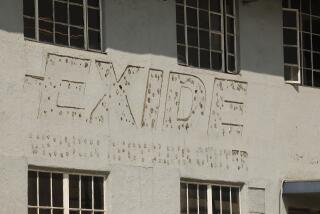Torrance Tries New Way to Regulate Chemicals : Refineries: In wake of Mobil setback, the city hires a research firm for $140,000 to help draft an ordinance to control use of hazardous materials.
- Share via
Just days after Torrance suffered a setback in its legal efforts to oversee safety at the Mobil Oil Corp. refinery, the City Council on Tuesday moved ahead on a different front with plans to regulate the use of dangerous chemicals throughout the city.
The council decided to hire an Ohio-based research firm to help fashion a new ordinance, which is intended to give the city the power to control the use of acutely hazardous materials.
The Battelle Memorial Institute will be paid about $140,000 to study how the city should measure the relative safety or risk of those materials. The effort is believed to be one of the first of its kind in the nation by a municipality.
A city review board would issue permits to companies that use acutely hazardous chemicals. The board could deny a permit or require changes in how a company handles a chemical.
Dow U.S.A. community representative Steve Whitehead, who has been monitoring the ordinance’s development for the Torrance Chamber of Commerce, praised the city’s selection of Battelle, calling it “a very good choice.”
About 360 chemicals are on a state list of acutely hazardous materials. An estimated 50 companies in Torrance use those materials, and the Mobil refinery is among the largest users, said R. Richard Nanney, hazardous materials officer at the Fire Department.
City Councilman Timothy Mock said the proposed ordinance could take on new importance in light of a court order last week naming Westinghouse Electric Corp.--a firm heavily criticized by city officials--as safety adviser at the refinery.
The choice has undermined some city officials’ confidence that the safety adviser will require Mobil to stop using hydrofluoric acid, a toxic chemical used in the production of unleaded gasoline. Mobil keeps about 22,000 to 29,000 gallons of the acid at the refinery in northern Torrance.
Under the terms of an October, 1990, consent decree, Mobil must stop using the acid by the end of 1997 unless it can commit to a modified hydrofluoric process by the end of 1994. The safety adviser is responsible for assessing the safety of any new process, under the supervision of retired Superior Court Judge Harry V. Peetris.
Mock says the proposed ordinance, and the chemical review board that would enforce it, could be another route by which the city could halt Mobil’s use of hydrofluoric acid.
“If we’re not successful with Westinghouse, and we’re not successful with Judge Peetris, then the chemical review board is a good backup in terms of local control,” Mock said Wednesday.
However, several of Mock’s council colleagues are less certain that it would serve as a vehicle for banning the use of hydrofluoric acid.
Councilman George Nakano said he plans to ask the city staff to analyze what power the ordinance would have if Westinghouse does not enforce the phase-out of the acid.
Mayor Katy Geissert said hydrofluoric acid was not the impetus for the ordinance or the chemical review board. “But certainly (the board) would be a very valuable backup” for evaluating Westinghouse’s findings, she said.
Assistant City Atty. Ronald Pohl said it is too early to tell how the proposed ordinance could affect the use of hydrofluoric acid.
The decision to move ahead with the ordinance is not tied to Westinghouse’s selection. Mock first proposed the ordinance nearly two years ago as an alternative to Councilman Dan Walker’s unsuccessful March, 1990, initiative to end Mobil’s use of hydrofluoric acid. The council authorized the search for a consultant last September. The 6-0 council vote Tuesday to approve the hiring of Battelle limits the cost to $139,992. Two other firms submitted bids for the job, but a group of city administrators recommended Battelle, citing its experience and approach.
Battelle, a not-for-profit institute, is the world’s largest independent research organization, said spokesman Robin E. Yocum. Founded in 1929, it employs about 8,000 people at four major sites in the United States and Europe. It was instrumental in developing the xerographic process of copying and the Universal Price Code.
Fred Leverenz, who will lead the Torrance project for Battelle, described the proposed ordinance as unique. “I don’t know of any other municipality that’s ever done anything like this,” he said.
More to Read
Sign up for Essential California
The most important California stories and recommendations in your inbox every morning.
You may occasionally receive promotional content from the Los Angeles Times.













